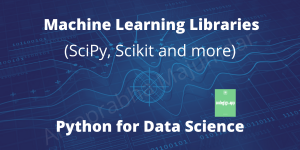Machine Learning Libraries – Python for Data Science (SciPy, Scikit and more)

Why Python for Machine Learning?
Firstly Python is noted for its readability and lower complexity, unlike other programming languages such as C, Java, etc.
Everyone should understand it easily and make it possible for others to understand it too.
Machine learning can be used by data scientists to analyse large amounts of data and derive valuable conclusions with relatively little effort.
Python supports several common in-built libraries that can be conveniently used to provide features for Machine Learning.
They have zero learning curve for these libraries. Getting a simple understanding of Python helps programmers to incorporate these libraries that are ready to use.
The best thing is under the GNU licence, these Python packages are free.
NumPy
Let’s run over some of the libraries used in the machine learning area that are widely used.
To perform mathematical and logical operations, NumPy is a key Python program.
Linear algebra operations and generation of random numbers are provided. NumPy stands for “Python Numerical”.
For conducting linear algebra operations, NumPy has built-in functions. And in order to perform complex mathematical calculations, NumPy supports multi-dimensional arrays.
Again in ML, it is essential for fundamental computations.
SciPy
SciPy, which is based on NumPy, is a Python library.
It makes use of arrays with NumPy. SciPy is used to perform sophisticated operations such as regression, convergence, and probability in a significant way.
Therefore in the field of machine learning, SciPy is widely used as it includes effective modules for statistics, linear algebra, computational routines, and optimization.
SK-Learn
Built on top of two famous Python libraries namely NumPy and SciPy, it features classical ML algorithms that include sorting, clustering, regression and preprocessing for computational data modelling.
It also offers Machine Learning solutions that are powerful and easy to use.
As well as unsupervised learning algorithms, Scikit-learn supports popularly used supervised learning algorithms. Help vector machines, grid search, gradient boosting, k-means clustering, DBSCAN, and several others are part of the algorithms.
The Scikit-learn library is recognized on several platforms for its optimum efficiency. This is the explanation for its success.
It is therefore used for academic and trade purposes.
Scikit-learn is used to construct models and as there are better frameworks available for the task, it is not recommended to use it for interpreting, manipulating, and summarising data.
It is open-source and is published under a license from BSD.
Shogun
Shogun is a free open-source, C++ implemented toolbox used for ML.
It supports multi-language interfaces (Python, Java, C#, Ruby, etc and platforms (Linux, Windows, macOS).
All be it computer scientists, journalists, hackers, teachers, etc., can use Shogun free of cost and with limited effort.
It offers efficient implementation of regular ML algorithms such as SVM, hypothesis of the kernel, multiple kernel learning, etc.
Users can import their docker image and run the Shogun cloud locally.
Shogun is able to scale thousands of OS setups and reliably process about 10 million data samples.
The Cloud of Shogun is non-commercial and accessible at universities for educational purposes.
TensorFlow (TF)
TensorFlow was originally created by Google Engineers for Google’s internal use.
But for a number of domains, the scheme is general enough to apply. The library became open source in 2015 and was published under the open source Apache 2.0 licence.
TensorFlow is a popular dataflow programming library. It is a symbolic math library that allows accurate calculations using various optimization techniques.
TensorFlow delivers versatile and flexible applications for multi-machine computations and computations requiring massive data sets. Therefore it is Machine Learning’s favourite platform.
The library is expandable and serves several platforms. It offers GPU support, increased performance, and better visualization for faster computations.
TensorFlow offers classification algorithms, models of inference, differentiation, etc.
For neural networks, TensorFlow offers rich API support.
Theano
Theano is a library of computational computations mainly. And Theano is mainly used to implement models of the neural network.
Theano enables mathematical expressions to be easily described, refined and validated effectively. Theano works on solving complex equations in mathematics. To execute these complicated operations, it utilises a multi-dimensional matrix utilising NumPy.
Therefore to test the expressions, Theano can find unstable expressions and overwrite them with stable ones.
And adding to that GPUs can be easily used by Theano. It offers optimisation of speed by performing pieces of Processor or GPU expressions.
Again Theano is clever enough to produce symbolic graphs for numerical gradients automatically and thus gives symbolic distinction. Platform-independent, Theano is.
Finally apart from these, we’ve already discussed Keras and Pytorch in other articles so check them out.
Ending Note
If you liked reading this article and want to read more, continue to follow codegigs. Stay tuned for many such interesting articles in the coming few days!
Happy learning! 🙂